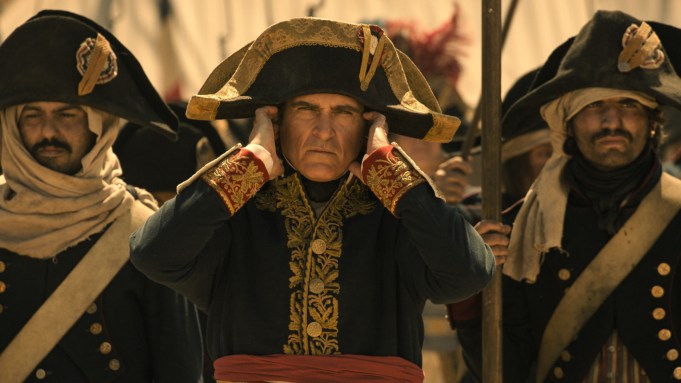For American audiences, there’s one clear deal-breaker.
We’ll accept antiheroes. We’ll let them rob banks, sell drugs, run gangs, spout biases, cheat on spouses. BUT they must be likable.
That comes to mind now, while pondering two current movies – “Napoleon” (shown here) and “Killers of the Flower Moon.” Here are epics, now in theaters (where they belong) before reaching Apple TV+. Each is by a master filmmaker, Ridley Scott and Martin Scorsese; each is oddly hard to like.
It also pops up while watching the original, British version of “Ghosts,” at 9 and 9:30 p.m. Thursdays on CBS. This is just like the American adaptation … except the characters are much less likable. That factor has been crucial, especially on TV:
— Adapting a British show into “All in the Family,” writer-producer Norman Lear decided quickly that Carroll O’Connor should be Archie Bunker. “I liked his face,” Lear wrote in “Even This I Get to Experience” (Penguin Press, 2014). “It was very important to me that Archie have a likable face.”
— Adding the difficult character of Frasier Crane to “Cheers,” director James Burrows chose Kelsey Grammer. He “can play a pompous ass who’s also sympathetic better than anyone I know,” he wrote in “Directed by James Burrows” (Ballantine, 2022). By the time the blowhard had his own show, he was easy to like. “One of the defining characteristics of Frasier is that he loved fully, wholly, deeply.”
— Creating “Breaking Bad,” writer-producer Vince Gilligan was on favorite turf. “I love the idea of a good character, and a good man, doing arguably bad things for good reason,” he told David Bianculli in “The Platinum Age of Television” (Doubleday, 2016).
In this case, there would be terrible things. “It was hard to try and rationalize the cooking and sale of meth as a life choice. We needed an actor the audience could sympathize with.” That was Bryan Cranston, fresh from being a sitcom dad (in “Malcolm in the Middle”) and endlessly likable.
These were not frilly TV executives looking for pretty faces. They were serious craftsmen, trying to bring audiences inside difficult characters.
Others have done the same. To get us to like Mafia killers, Francis Coppola chose Al Pacino and James Caan; David Chase chose James Gandolfini and gave him a family and a therapist. To get us to like bank robbers, people chose Warren Beatty, Faye Dunaway, Paul Newman and Robert Redford.
Are some characters impossible to like? Certainly, the actions in “Killers of the Flower Moon” are vile.
But Scorsese could have chosen to tell the story from any perspective. He told it through two men so awful that even Leonardo DiCaprio and Robert De Niro could’t give them much humanity.
For “Napoleon,” Scott didn’t even try. In his “Gladiator,” Juaquin Phoenix was a vile villain; for “Napoleon,” Phoenix simply put the same cold scowl under a weird hat.
There would have been many ways to get us to like this intense guy who came from common-man roots to battle royalty. “Napoleon” does none of that; even its love scenes are unromantic and its sex scenes are asexual. And amid the splendors of France, things are oddly drab.
Both movies are well worth seeing … and seeing in theaters, where God intended them to be. Important, real-life stories are told by directors who, at times, show their great skill.
“Ghosts,” as I understand it, is not based on real life. Americans did what Norman Lear had done a half-century earlier – take a clever British concept and make the characters more likable.
A mean-spirited dowager became warm and human … a thick-headed (literally) caveman became a neatly complicated Viking … a pantsless bureaucrat became a pantsless Wall Steeter, gradually aware of his own me-first ways. The new homeowners quickly liked these folks.
It might sound silly, thinking we have to like ghosts, robbers, warriors and such, but it’s part of the contract a movie or TV show makes with the American audience. If you gets us to like people, we’ll follow them into deep, dark places.

“Napoleon” and others hit likability limits
For American audiences, there’s one clear deal-breaker.
We’ll accept antiheroes. We’ll let them rob banks, sell drugs, run gangs, spout biases, cheat on spouses. BUT they must be likable.
That comes to mind now, while pondering two current movies – “Napoleon” (shown here) and “Killers of the Flower Moon.” Here are epics, now in theaters (where they belong) before reaching Apple TV+. Each is by a master filmmaker, Ridley Scott and Martin Scorsese; each is oddly hard to like.
It also pops up while watching the original, British version of “Ghosts,” at 9 and 9:30 p.m. Thursdays on CBS. This is just like the American adaptation … except the characters are much less likable. That factor has been crucial, especially on TV: Read more…